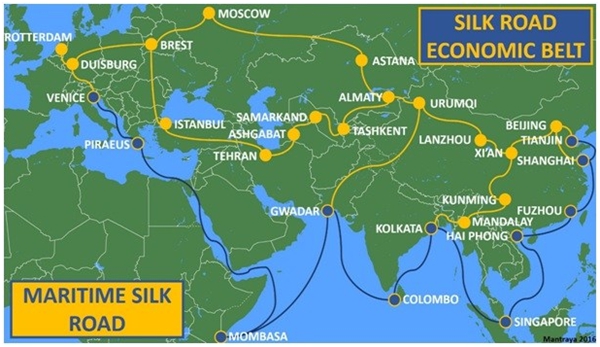BRI and SCO: China's chance to fill regional vacuum
- By Einar Tangen
 0 Comment(s)
0 Comment(s) Print
Print E-mail China.org.cn, June 9, 2017
E-mail China.org.cn, June 9, 2017
|
|
|
Silk Road Economic Belt and Maritime Silk Road [File Photo] |
Kazakhstan is the first stop as well as the lynchpin for the three land routes of China's Belt and Road Initiative (see maps). In this context, President Xi Jinping's state visit to Kazakhstan is essential to the new trade routes that will contribute to the easing of Chinese dependence on its East and South China seas shipping channels.
While Kazakhstan is a crucial first link, the BRI will be dependent on each State link, so making it vulnerable to natural, political and economic risks. The costs will also be enormous and eventually require more participatory funding. This will require a consensus approach that is at odds with the corporate majority rule approach favored by developed nations since the end of WWII.
Nations will only participate in the BRI if they see mutual benefits, and as such, cannot be coerced into participating.
For a consensus approach to be successful, China will have to know and understand the politics, laws, regulations, economics, languages and culture not only of Kazakhstan but every country involved in the BRI. It will mean an enormous amount of educational and people-to-people exchange activities.
China's answer has been to create 10,000 scholarships and establish various Confucius Institutes; however, although seemingly large in number and the amount of resources, they alone will not be enough. It is probable that these efforts will have to increase by a factor of 10 if this essential part of the process is to be effective.
The Belt and Road Initiative (BRI) and the Shanghai Cooperation Organization (SCO) will showcase how China's new role as a planner, facilitator, consensus builder and proponent of multilateralism, is in sharp contrast to current American diplomacy and policy by Tweet, demands, corporate majority rule philosophy and isolationist policies and direction.
This brings us to President Xi's current visit to Kazakhstan, a landlocked country dependent on larger economic neighbors, Russia and China. Kazakhstan's improved ability to get its products and resources to markets in Europe and Southeast Asia will increase its market reach and may encourage its manufacturing and processing industries to look beyond marginal processing industries and value added manufacturing.
New jobs and higher margins will be the keys to economic growth of states along the BRI, especially in areas where the lack of transportation infrastructure and trade services prevented growth. This will help China, as long as it is able to provide more sophisticated high quality goods and services, at lower prices, than its competitors.
Kazakhstan will, therefore, be a proving ground for the BRI's industrial, manufacturing and services capacity-building program. Nations, along the new "land bridges" will be looking carefully at how the BRI is able to contribute to increasing and elevating their economies.
President Xi, of course, is also in Kazakhstan to attend the annual meeting of the SCO, which will induct India and Pakistan as members. Their presence brings into focus SCO's crucial role in the BRI trade initiative, as without security the trade route will be useless.
China and its partners along the BRI routes can expect outside interference from state and non-state actors, for example: rival powers, ideologues and terrorists, that will have to be dealt with by a very strong sense of shared benefits and requiring China to take a more consensus-building role.
The entrance of Pakistan and India will be a strong signal that security, in the end, is not about politics, but about mutually-shared interests, but only so long as all countries refrain from bringing their previous or current conflicts into the group. It will need to be an organization that agrees to work on consensus projects and initiatives, not settling old scores or disputes.
One of the major issues China will need to confront as its role expands in a U.S.-created vacuum is the issue of the Great Power Trap, occurring when a power becomes so dominant that there's an assumption it must solve the world's problems.
The lesson of what happened to the U.S. when it adopted American Exceptionalism and then assumed the role as the world's policeman should be a learning opportunity for China. The experiment has ended with bitter recriminations and a retreat into isolationism, as Americans seem to feel they were used and unappreciated. On the other side, many nations regard American actions as having brought calamity and instability to their countries, cultures and the world in general.
Xi's state visit, and the SCO meeting in Kazakhstan, is simply the first in a series of steps, on a rocky road, for China, as it seeks to create a win-win regional trade mechanism. The irony that what started out as a necessity to avoid being blockaded along its sea routes, in response to American encirclement and containment campaign, has now become a leading economic revival tool.
Einar Tangen is a political and economic affairs commentator, author and columnist.
Opinion articles reflect the views of their authors, not necessarily those of China.org.cn.







Go to Forum >>0 Comment(s)